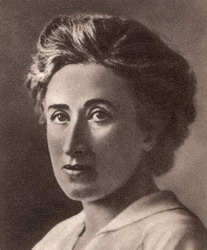

|
|

Organizational Questions of the Russian Social Democracy
Luxemburg, Rosa
http://www.connexions.org/CxArchive/MIA/luxemburg/1904/questions-rsd/index.htmhttp://www.marxists.org/archive/luxemburg/1904/questions-rsd/index.htm Publisher: Iskra and Neue Zeit Year Published: 1904 Resource Type: Article Cx Number: CX7965 Rosa Luxemburg's contribution to the debate within the Russian Social Democratic movement on party organization and democratic centralism. Luxemburg joins Trotsky in warning of the dangers inherent in centralism and argues against the concentration of power in a Central Committee. From a Socialist Revolutionary perspective Luxemburg puts forward compelling arguments against Lenin's conception of the revolutionary party. Abstract: Excerpt: Social Democratic centralism cannot be based on the mechanical subordination and blind obedience of the party membership to the leading party center. For this reason, the Social Democratic movement cannot allow the erection of an air-tight partition between the class-conscious nucleus of the proletariat already in the party and its immediate popular environment, the nonparty sections of the proletariat. Now the two principles on which Lenin's centralism rests are precisely these: 1. The blind subordination, in the smallest detail, of all party organs to the party center which alone thinks, guides, and decides for all. 2. The rigorous separation of the organized nucleus of revolutionaries from its social-revolutionary surroundings. Such centralism is a mechanical transposition of the organizational principles of Blanquism into the mass movement of the socialist working class. In accordance with this view, Lenin defines his "revolutionary Social Democrat" as a "Jacobin joined to the organization of the proletariat, which has become conscious of its class interests." The fact is that the Social Democracy is not joined to the organization of the proletariat. It is itself the proletariat. And because of this, Social Democratic centralism is essentially different from Blanquist centralism. It can only be the concentrated will of the individuals and groups representative of the working class. It is, so to speak, the "self-centralism" of the advanced sectors of the proletariat. It is the rule of the majority within its own party. ... [Lenin] is convinced that all the conditions necessary for the formation of a powerful and centralized party already exist in Russia. He declares that, "it is no longer the proletarians but certain intellecutuals in our party who need to be educated in the matters of organization and discipline," (page 145). He glorifies the educative influence of the factory, which, he says, accustoms the proletariat to "discipline and organization," (page 147). Saying all this, Lenin seems to demonstrate again that his conception of socialist organization is quite mechanistic. The discipline Lenin has in mind is being implanted in the working class not only by the factory but also by the military and the existing state bureaucracy - by the entire mechanism of the centralized bourgeois state. We misuse words and we practice self-deception when we apply the same term - discipline - to such dissimilar notions as: 1. the absence of thought and will in a body with a thousand automatically moving hands and legs, and 2. the spontaneous coordination of the conscious, political acts of a body of men. What is there in common between the regulated docility of an oppressed class and the self-discipline and organization of a class struggling for its emancipation? The self-discipline of the Social Democracy is not merely the replacement of the authority of bourgeois rulers with the authority of a socialist central committee. The working class will acquire the sense of the new discipline, the freely assumed self-discipline of the Social Democracy, not as a result of the discipline imposed on it by the capitalist state, but by extirpating, to the last root, its old habits of obedience and servility. Subject Headings |